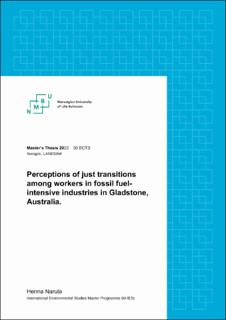| dc.description.abstract | This thesis aimed to gain insight into how communities affected directly by energy transition policy and just transition ideas perceive them. Right-wing populist views and place attachment were factors considered when investigating the community’s perceptions of just transitions. The study setting was the industrial town of Gladstone in Queensland, Australia. Two research questions were formulated to provide insight on the research objective. Firstly, how do people living in Gladstone and working in industry react to energy transition policy and understand just transitions? Secondly, what, if any, influence do factors like right-wing populist rhetoric and place attachment have on perceptions of energy transition policy and just transitions? To investigate these questions, a qualitative method consisting of semi-structured interviews was used, focusing on a sample group of people who lived in Gladstone and worked in industry. The data was collected, transcribed, coded, and analysed for all 11 interviews. The analysis yielded four major categories of findings, which each contained several themes expanding upon the main finding. Generally, the interviewees viewed fossil fuel phaseout as necessary and just transition principles as important in achieving this. However, they had concerns regarding key elements of the transition plans. These concerns included planning and feasibility, proposed timelines for implementation, economic aspects, and material and waste associated with renewable energies. The interviewees also pointed to lacking community consultation as an issue, which suggests procedurally unjust outcomes may occur. While a few interviewees expressed resistance to energy transitions, a greater number of interviewees reported that other people in Gladstone were resistant, usually due to concern regarding their personal career prospects. Regardless of their support or resistance of transitions, interviewees perceived it as a political process, citing government incompetence as a factor hindering achieving positive outcomes. Furthermore, the findings suggest that populist rhetoric has become mainstreamed in Australia, demonstrated by the interviewees using populist rhetoric regardless of their position on the left-right political spectrum. Additionally, the findings suggest that high place attachment may manifest as increased anxiety for their town, but not necessarily as resistance to just transitions. A common theme among interviewees was the recognition that managing their personal future in industry and their desire to avoid drastic climate change was a complex undertaking, which could be aided by just transition principles. These understandings of transitions suggest a hopeful future for a greener Gladstone. | |
